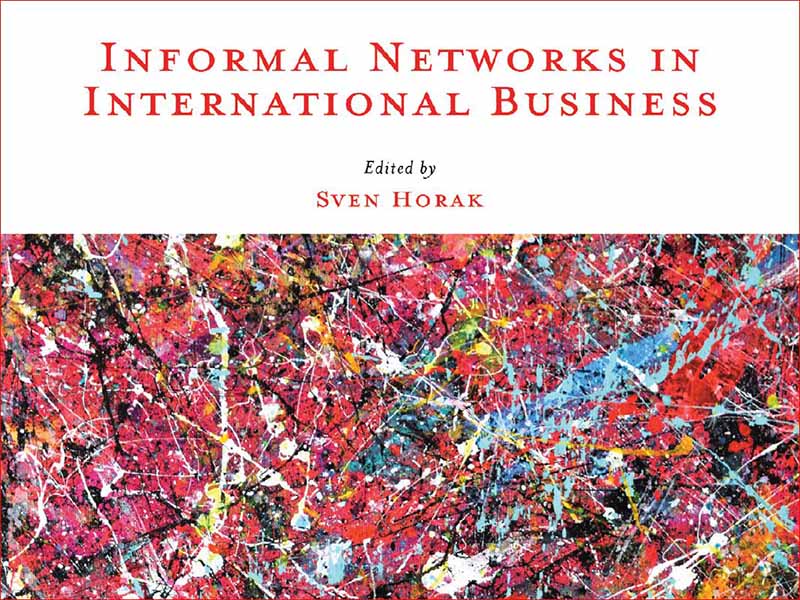- عنوان کتاب: Informal Networks in International Business
- نویسنده: Sven Horak
- حوزه: تجارت, تجارت بین المللی
- سال انتشار: 2022
- تعداد صفحه: 265
- زبان اصلی: انگلیسی
- نوع فایل: pdf
- حجم فایل: 4.99 مگابایت
شبکه سازی به طور گسترده به عنوان فعالیتی در نظر گرفته می شود که مدیران باید به سادگی انجام دهند تا کارها را انجام دهند و به اهداف شرکت برسند، به طور حرفه ای پیشرفت کنند یا از فرصت ها مطلع شوند. شبکه سازی تنها یک تکنیک مدیریتی نیست. این در مورد ملاقات با مردم و توسعه روابط است، زیرا برای بسیاری از فعالیتها وقتی همکاری میکنیم، کمک میگیریم و کمک میکنیم، و به دیگران حسن نیت و حمایت میکنیم، وضعیت بهتری داریم. این به نوبه خود برای رفاه اجتماعی و رشد شخصی ما مهم است. از آنجایی که برخی افراد بیشتر از دیگران درگیر شبکه هستند، در اصل همه ما به دلایل مختلف شبکه می کنیم. در حالی که همه ما ایده بسیار خوبی داریم که شبکه چیست و چگونه کار می کند – دوست داشته باشیم یا نه – نحوه عملکرد شبکه در خارج از کشور، در کشورها یا مناطقی که برای ما ناآشنا است، برای بسیاری از ما چندان واضح نیست. ملاقات با مردم و توسعه روابط، یعنی شبکه سازی، معمولاً بر اساس ارزش های مشترک و هنجارهای رفتاری است. تعهد به روابط، مانند ایده آل های نوع دوستی و هنجارهای متقابل، برای نام بردن از چند ویژگی، نقش دارد. از آنجایی که ارزشها، هنجارها و ایدهآلهای مربوط به ایجاد رابطه در سراسر جهان متفاوت است، روشهایی که در آن شبکههای مردمی نیز میتوان متفاوت فرض کرد. این همان جایی است که این جلد ویرایش شده به دنبال مشارکت است. مدیرانی که در خارج از کشور کار می کنند اما در محیطی متفاوت اجتماعی هستند، به عنوان مثال، مهاجران، و همچنین مسافران تجاری، مدیران اجرایی، نمایندگان کشور در دفتر مرکزی و دیگران، از جمله کسانی هستند که به دلایل متعددی نیاز به ادغام و اتصال به شبکه های غیررسمی خارج از کشور دارند. ظهور چین، و بر همین اساس هجوم تجار از سراسر جهان، روش شبکه سازی چینی، معروف به گوانشی را به برجسته ترین نمونه شبکه های غیررسمی تا به امروز تبدیل کرده است. در حالی که هر مدیر خارجی اهمیت مرکزی توسعه و حفظ گوانکسی در چین را می داند، ویژگی ها و ساختارهای دیگر شبکه های غیررسمی، به عنوان مثال، yongo (کره)، واستا (جهان عرب)، جیتینهو (برزیل)، blat/svyazi (روسیه) سیفاریش (پاکستان)، جان پهچان (هند)، و بسیاری دیگر، تا حد زیادی ناشناخته باقی مانده اند، دست کم گرفته شده اند، یا توسط بسیاری از مدیران خارج از کشور درک نشده اند. بیشتر ساختارهای شبکه نامگذاری شده در این جلد ویرایش شده نشان داده شدهاند. شبکه های غیررسمی اغلب بازتابی از ساختارهای اجتماعی هستند و عمیقاً در محیط فرهنگی مربوطه ریشه دارند. از این رو، درک آنها و توسعه شایستگی شبکه غیررسمی برای مدیریت موفقیت آمیز محلی ضروری است. شبکههای غیررسمی میتوانند عاملی تأثیرگذار در عملیات روزانه در رهبری و مدیریت منابع انسانی (استخدام، انتخاب، ارتقاء)، در فروش، کسب پروژه و توسعه کسبوکار، یا در هر کارکرد مرتبط با مدیریت روابط به طور کلی باشند. درک شبکههای غیررسمی به مدیریت بهتر ریسکها و فرصتها در کسبوکار کمک میکند، از جمله مواردی که اجرای رسمی آنها دشوار است. قبل از اینکه بتوانیم به نحوه شبکه سازی موثر در خارج از کشور فکر کنیم، باید بدانیم که شبکه سازی چیست، چه ایده آل هایی حاکم است و چه ساختارهایی احتمالاً از قبل وجود دارند که شبکه ها را می سازند. در حالی که شبکههای غیررسمی اشکال مختلفی دارند، در این کتاب ما عمدتاً ساختارهای شبکه غیررسمی را مورد بحث قرار میدهیم و ویژگیها و ارتباط آنها با فعالیتهای تجاری بینالمللی را از دیدگاههای نظری و عملی بیان میکنیم. با توجه به درهم تنیدگی نظریه ها، مفاهیم و سازه های پیرامون شبکه های غیررسمی، تفکیک واضح آنها از یکدیگر دشوار است. در حالی که برخی از مشارکتها در این کتاب بیشتر بر جنبههای کلی شبکههای غیررسمی متمرکز هستند، برخی دیگر به ترتیب درباره ماهیت متمایز آنها اطلاعات میدهند. بر اساس این ایده، کتاب به سه بخش تقسیم شده است. هر بخش متنوع است و منعکس کننده ماهیت فعلی این رشته است. در حالی که مشارکتهای بخش اول، نظریهها، مفاهیم و مشاهدات نوظهور در مورد شبکههای غیررسمی را ارائه میکنند، آثار در بخش دوم به ساخت دانش کمک میکنند. بخش پایانی بیشتر شامل مشارکتهایی است که به حوزههای بالقوه تحقیقات آینده در شبکههای غیررسمی اشاره میکند.
Networking is widely regarded as an activity managers should do, simply speaking, to get things done and to meet corporate goals, to get ahead professionally or stay informed about opportunities. Networking is not solely a management technique. It is about meeting people and developing relationships as for many activities we are better off when we collaborate, receive and give help, and offer goodwill and support to others. This in turn is important for our social well-being and personal growth. As some people engage more in networking than others, in principle we all network for different reasons. While we all have a pretty good idea what networking is and how it works – like it or not – how networking works abroad, in countries or regions unfamiliar to us, is not so clear to most of us. Meeting people and developing relationships, i.e., networking, is usually based on shared values and behavioral norms. Commitment to relationships plays a role, as do the ideals of altruism and norms of reciprocity, to name just a few features. As values, norms, and ideals relevant to relationship building differ around the globe, the ways in which people network can be assumed to differ too. This is where this edited volume seeks to contribute. Managers working abroad but being socialized in a different environment, i.e., expatriates, as well as business travelers, traveling executives, country representatives at headquarters and others, are among those who need to integrate and connect to informal networks abroad for several reasons. The rise of China, and accordingly the influx of businesspeople from all over the world, has made the Chinese way of networking, known as guanxi, the most prominent example of informal networking to date. While every expatriate manager knows the central importance of developing and maintaining guanxi in China, the characteristics and structures of other informal networks, for instance, yongo (Korea), wasta (Arab world), jeitinho (Brazil), blat/ svyazi (Russia), sifarish (Pakistan), jaan-pehchaan (India), and many others, remain largely unknown, underestimated, or misunderstood by many expatriate managers. Most of the named network constructs are featured in this edited volume. Informal networks are often reflections of societal structures and deeply engrained into the respective cultural environment. Hence, understanding them and developing informal network competence is pivotal for successfully managing locally. Informal networks can be an influential factor in day-to-day operations in leadership and human resources management (recruitment, selection, promotion), in sales, project acquisition and business development, or in any functions relating to relationship management at large. Understanding informal networks helps in better managing risks and opportunities in business, including those difficult to formally enforce. Before we can think of how to network effectively abroad, we need to understand what networking is about, what ideals prevail, and what structures possibly preexist that make up networks. While informal networks come in different shapes, in this book we predominantly discuss informal network constructs, outlining the characteristics and their relevance to international business activities from theoretical and practical perspectives. Given the intertwinement of theories, concepts, and constructs surrounding informal networks, it is difficult to clearly separate them from each other. While some contributions in this book focus more on general aspects of informal networks, others inform about their distinct nature respectively. Following this idea, the book is divided into three parts. Each part is diverse, reflecting the current nature of the field. While contributions in the first part present emerging theories, concepts, and observations about informal networks, works in the second part contribute to construct knowledge. A further, final part features contributions pointing out potential future areas of research on informal networks.
این کتاب را بصورت رایگان از لینک زیر دانلود نمایید.



































نظرات کاربران